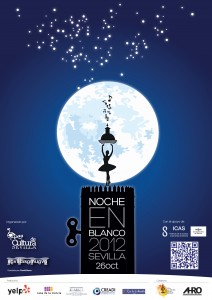The Long Night (Die Lange Nacht) is an initiative born in Berlin in 1997 with the goal of offering a nocturnal cultural programm to the citizens. The opening of expositive spaces as an exceptional case and with annual character, supposes an incentive for the attending public, enjoying an atmosphere far from the daily.
In 2002, Paris gives another turn of the screw and presents it as the White Night (La Nuit Blanche) including scenic arts to the nocturnal cultural programm.
In Sevilla we enjoyed this event first in 2007. It was called La Noche Larga, and it achieved a great success among the Seville citizens for the three held editions, with a remarkable increase of the number of visitors. Nevertheless, the citizen answer was not kept in mind, judged by the withdrawal of public support for the 2010 edition. Since then, Seville has been consigned to be a mere spectator in the distance, observing how other cities, near or far, increase their sensitiveness for culture. This is a right and a precious good which must not be lost even in crisis.
On this occasion, from a position away from the public organisations, we pretend to spur on these as well as on private entities, so that Seville can be one of these many cities using and enjoying culture. Even happening it a night a year, it may be used to enjoy the cultural variety we own and maybe many still don’t know.
La Noche Larga (Der Lange Nacht) es una iniciativa que nace en Berlin en 1997 con el objetivo de ofrecer una programación cultural nocturna a los ciudadanos. La apertura de espacios expositivos de forma excepcional, y de carácter anual, supone un aliciente para el público que acude al llamamiento, disfrutando de un ambiente alejado de lo cotidiano.
En 2002, Paris da una vuelta de tuerca más, y presentándola como Noche en Blanco (La Nuit Blanche) incorpora las artes escénicas al programa cultural nocturno.
En Sevilla disfrutamos por primera vez de este evento en 2007. Se denominó Noche Larga, y durante las tres ediciones celebradas cosechó una gran acogida entre los sevillanos, aumentando notablemente el número de visitantes. No obstante, la respuesta ciudadana no fue tenida en cuenta, a juzgar por la retirada de apoyo público para la edición de 2010. Desde entonces, Sevilla se ve relegada a una mera espectadora en la distancias, observando como otras ciudades, próximas y lejanas, incrementan su sensibilidad por la cultura, un derecho y un bien preciado que no debe perderse ni en tiempos de crisis.
En esta ocasión, desde una posición alejada de los estamentos públicos, pretendemos espolear tantos a estos como a entidades privadas para que Sevilla pueda ser una más de tantas ciudades que usan y disfrutan la cultura, que aunque sea una noche al año sirva para que podamos disfrutar de la variedad cultural que poseemos y que quizás muchos desconozcan.


